Login
2 active alerts
Show
Surgical Care
Surgical Pain Management
The care team will decide with you what medicines are best for you.
Manage Your Pain
The best way to control your pain after surgery is to start managing it before surgery.
Your comfort is important to us! ChristianaCare’s comprehensive pain management program is designed to help you manage your pain with less need for opioids or narcotics.
Before we take you to the operating room, we will give you a combination of non-opioid pain medicines, such as acetaminophen, celecoxib, gabapentin, ibuprofen and/or ketorolac to take with a sip of water.
Taking these medicines before surgery helps:
Your care team will partner with you to decide what medicines are best for you.
Why is it so Important to Reduce the Amount of Opioid Pain Medicine You Need After Surgery?
Remember These Tips to Manage Pain at Home After Surgery
Providers & Staff
Managing Surgical Pain
Related Content
Enhanced Recovery After Surgery is a care plan that helps you get back to your full health as quickly as possible.
First gynecologic-focused review supports newer guidance on continued use of GLP-1 medications



